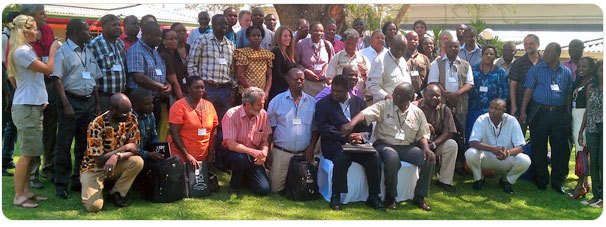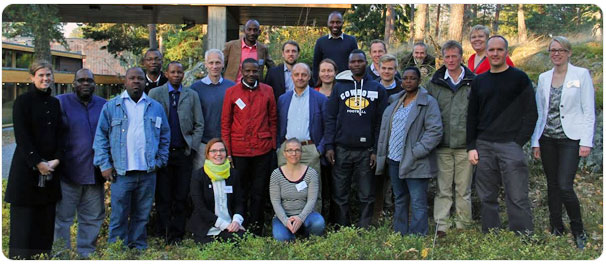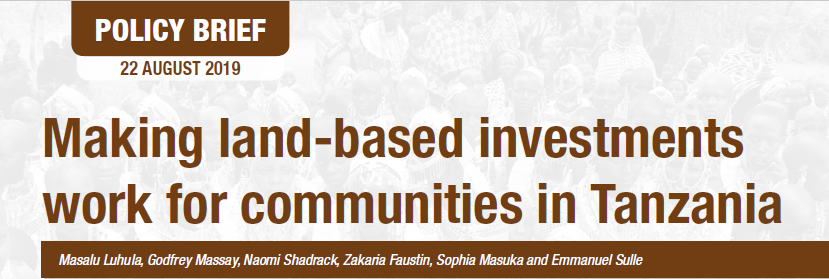TNRF participated in Dialogues related to CBNRM and land/forest-based investment
October 2014 was a ‘dialogue’ month linking the South to South and South to North. TNRF engaged effectively in two important dialogues:
DIALOGUE 1: NORAD/WWF REGIONAL CBNRM DIALOGUE 20-21 OCTOBER 2014 (LUSAKA, ZAMBIA)

TNRF has joined the Southern Africa CBNRM Forum (SACF) which includes seven SADC member countries: Tanzania, Zambia, Mozambique, Zimbabwe, Malawi, Namibia and Botswana. TNRF is also the host of the National CBNRM forum in Tanzania. SACF organized a Regional CBNRM dialogue on 20-21 October 2014 in Lusaka Zambia, involving all its member countries and invited development partners and government representatives. The dialogue was held at Southern Sun Hotel in Lusaka.
The dialogue simultaneously marked the end of the NORAD/WWF Regional Capacity Building Programme in Southern Africa and formally launched the Southern African CBNRM Forum (SACF) which is in the process of being formalised and registered in Lusaka to champion CBNRM at regional level. The programme responds to the reality that although national, regional and international legal frameworks through various individual pieces of legislation, treaties and conventions support effective community involvement and sharing of benefits, much work still needs to be done at all levels. This is especially demonstrated by the fact that currently the observed and reported high levels of natural resource degradation is partly a result of high levels of poverty and policy positions that do not adequately provide for community participation in sustainable utilization of natural resources. The opportunities favour investors from the urban areas and other countries above communities. As such, there are more incentives for illegal harvesting than complying with the law. In countries where these opportunities have been opened to communities, not only have the benefits increased but more jobs have been created, attitudes towards natural resource management have changed and conservation is practiced not as an end in itself but as part of integrated rural development. In such areas, it has also been noted that wildlife populations have recovered and environmental degradation reduced.
Building on the above background, this regional dialogue discussed the performance, challenges and future prospects for CBNRM in the region with particular interest in lessons learning and developing linkages with other emerging and cross cutting issues such as food security, climate change adaptation, citizen empowerment, democratisation, decentralisation and land rights.
TNRF teamed up with its partners MJUMITA and MCDI, and a representative from the Ministry of Natural Resource and Tourism (Tanzania) to represent the National CBNRM Forum. Jointly, TNRF and its partners made a presentation titled “Does CBNRM improve NRM? Case study on Community Forestry”
Other presentations made during the dialogue include:
- 30 years of CBNRM in Southern Africa
- CBNRM and Agriculture-Revisiting the old paradigm
- Climate Change Resilience and CBNRM in Namibia
- Fisheries Management in the context of CBNRM-Malawi
- Green economies
- Lessons from the Regional CBNRM programme
- CBNRM-Myth or Reality?
- Panel Discussion-CBNRM Myth or Reality.ppt
- Promoting community plantation forestry Management in Zimbabwe
- SACF strategic Plan
- SACF-Key issues for the future
- ZAWA-CBNRM
A detailed report of this dialogue will follow later.
DIALOGUE 2: INITIAL SOUTH-NORTH DIALOGUE REGARDING INVESTMENT IN LOCALLY CONTROLLED FORESTS IN TANZANIA AND MOZAMBIQUE, 28-29 OCTOBER 2014 (HELSINKI, FINLAND)

This dialogue was prepared by WWF Finland in collaboration with WW Coastal East Africa Initiative (CEAI). WWF Finland has been working with partners in Tanzania and Mozambique through WWF-CEAI on a programme both to promote dialogue on forest investment and to locally initiatives to test and scale up models of ‘investment in locally controlled forestry’ or ILCF. This programme has been supporting dialogue on locally controlled forestry and investment at national/regional level, ‘south-south’ experience sharing, and ‘south-north’ collaboration. Associated with this dialogue process has been a WWF CEAI/Sweden initiative supporting partners CBOs and local NGOs in their applied field models of ILCF in Tanzania and Mozambique.
The dialogue held on 28th and 29th October 2014 formed an initial step in a 3 year programme towards enabling discussions, active engagement between stakeholders from South (Tanzania and Mozambique) and North in identifying key enabling mechanisms and options for enhancing equitable and sustainable investment in locally controlled forestry. The dialogue brought together presentations and discussion of:
- The experiences and perspectives directly from local entities in Tanzania and Mozambique testing out applied ILCF initiatives, as well as the voices of CSO forest-land forums and alliances
- Global experience of ILCF and emerging models from various institutions
- Current or potential investors and donor partners interested or wishing to learn more about such innovative approaches.
Presentations from this dialogue can be accessed here.
In this dialogue, Tanzania CSOs were represented by TNRF (through its CBNRM Programmes Coordinator), MJUMITA (through its Executive Director) and MCDI (Through its Chief Executive Officer)
A detailed report of this dialogue will follow later.

